
Sustainable diets promote health, are good for the environment, are accessible, and are affordable.
A lot of diets focus only on weight loss or weight gain and promoting overall human health, but they don’t focus on promoting environmental health.
Your food choices can impact not only your health but your personal environmental footprint as well, which is why you should care about both.
In this post, I’m going to help you learn how you can eat healthily and sustainably.
How To Eat A Sustainable Diet
What Does A Sustainable Diet Look Like
A sustainable diet, as I mentioned above, is a healthy diet that helps your well-being, while also taking care of the environmental impact the food we eat has.
It consists of foods that aren’t bad for the food supply, and don’t require too much processing or too many resources. It helps ensure there is little to no food waste, and that there will be enough food resources for future generations.
Let’s get into tips on how to eat a sustainable diet.
Try to buy your fruit and vegetables at farmer’s markets
Eat fruit and vegetables
Fruit and vegetables are some of the best things you can eat to live sustainably. It’s important to eat more plants, as they’re not only very healthy for you, but they are much better for the environment than meat, because meat production is worse for the environment.
Food production has a big impact on greenhouse gas emissions, so it’s important to choose plant-based foods whenever possible.
Try a vegetarian or vegan diet
Vegan and vegetarian diets are the best diets for the environment. They have the biggest reduction in land use and greenhouse gas emissions. The vegetarian diet also uses the least water out of all other diets.
So, you can try a plant-based diet and eat more plants. If you don’t want to stop eating animal products altogether, you can try to eat plant-based most of the week, and eat animal products (animal proteins and dairy products) every now and then.
Don’t eat processed foods
The worst thing for the environment is processed foods. That’s why you should strive to eat as many unprocessed foods as possible.
First of all, unprocessed foods are always much healthier for you than processed foods, as they’re natural, and don’t contain any added sugars or other bad things.
Secondly, processed foods have a bad impact on environmental health, as they require too much energy.
Eat less red meat
While red meat does have some health benefits, such as good protein and iron content, it has also been linked to an increased risk of cancer. So, while you don’t have to stop eating red meat altogether, try to limit it, and eat it every so often.
If it’s a part of a balanced diet, it’s better for you than if you eat it almost every day.
Plus, farming animals requires lots of space and water, so it’s not the best for the environment at all.
Grow your own food
An amazing way to live sustainably is to grow your own food. While eating more fruit and vegetables is amazing on its own, if you grow them yourself, you’re taking a step further toward helping the environment.
Reducing the space and water it takes to plant foods is a great thing for environmental health, plus, this way you know the fruit and vegetables you eat have been grown well.
Buy in season
Buying in season is another important thing. When you buy out-of-season produce, that means they had to be grown in greenhouses and not naturally in season.
That’s why you should always buy fruits and vegetables when they’re in season.
They are also healthier and have more nutrients when they’re in season.
Eat whole grains
Whole grains are less processed than regular grains, which makes them healthier and better for the environment. Whole grains have, as the name suggests, the whole grain still there, which provides more nutrients. Processed grains have been stripped away from lots of good things your body needs.
Eat legumes
Along with fruits and vegetables, legumes are great for the environment and for your health. They take less energy to produce than meat, and they’re filled with protein, nutrients, fiber, and so on.
If you’re trying out the vegan or vegetarian diets, legumes will provide lots of protein you might be missing from meat. However, even if you do eat meat, try to include legumes as much as possible in your diet, as they have lots of health benefits.

















